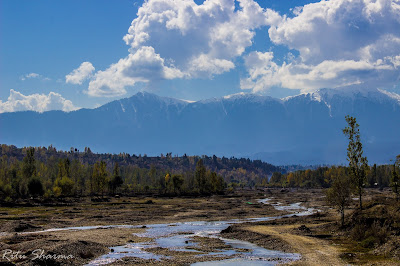September 2018
Tikpora Lolab (Kashmir): It was on October 11 that her brother was
killed during a gunfight with the security forces. Her tears have since dried
up, but the flow of mourners continue unabated in their house in the beautiful
Lolab Valley of Kashmir. Asimah is trying to come to terms with the death of
her brother Manan Wani, but she keeps saying one thing: “It (joining militancy)
was so sudden that we did not realise it. We knew when he picked up gun that he
will kill someone or get killed.”
The despondence in Asimah’s voice is also palpable in Manan
Wani’s father – Bashir Ahmed Wani, a lecturer at a college in nearby Sogam
area. Sitting stoically as mourners continue to pour in from across Kashmir,
Bashir exhorts the politicians to find a solution to wrest the growing trend of
youth picking up guns. “I am not a politician. I cannot tell why children are
picking up gun. It is for the politicians to find a solution,” Bashir said.
Manan Wani has shocked people across cross-sections of
Kashmir conundrum for leaving behind an illustrious life that waited for him
and picking up guns. But, the story emerging from the profiles of recent
militants killed at the hands of security forces is a sordid one. In these
stories parents are rendered helpless in stemming the growing number of
youngsters opting for militancy to push back the high-handedness of security
forces. Similar disbelief is writ large on the face of the father of Ashiq
Hussain Zargar, the 23-year-old joined Hizbul Mujahideen and was killed along
with Manan Wani. Ashiq was the sole bread winner of his family.
After Burhan Wani’s death, everyone in Kashmir had come out
on streets and pelted stones. The state police responded by invoking the Public
Safety Act (PSA) – 1978, which allows preventive detention of people against
whom there is no criminal track record. Hundreds
of people, including juveniles, have been jailed on administrative orders of
the deputy commissioners following the death of Hizbul Mujahideen Commander
Burhan Wani. Those detained were treated like hardened criminals and children
as young as 15-year-old were put alongside criminals. “Everyone had pelted
stone after Burhan Wani’s death. What police did was to slap PSA against the young.
Many a times the police men would ask Ashiq to come. He was scared that he
would be tortured, so he ran away,” said Ashiq’s younger brother Firdaus, his
eyes emotionless. Ashiq had been missing for 5 months and they had filed a
missing person report.
Harangued parents have run pillar to post to locate their
children arrested under PSA. From 2016-February 2018, 1,150 people were
detained under PSA. As many as 55-60 per cent of the detainees were in the age
group of 15-28 years. Under PSA there is no trial as all detainees are
considered guilty. Sometimes, even if the parents manage to get the PSA order
quashed against their child quashed, the police immediately gets another
detention order against them. Under the Section 8 (ii) of the Act, a person can
be detained for up to 2 years from the date of offence, if the offence is
prejudicial to the security of the state.
“PSA is being used to target the youth. And the no-talks
stand of the Centre is increasing militancy. Most militancy recruitment are
successful due to trust deficit in the youth,” says Waheed Ur Rehman Para, the
youth president and Spokesperson of Jammu and Kashmir Peoples Democratic Party
(PDP). The narrative of ‘dignity in death’ among the youngsters has gained
traction and is reflected in the spike in number of militants in the valley
from the all-time low of 78 in 2013 to nearly 360 in 2018. The number has
increased even as the security forces have killed around 170
terrorists/infiltrators since January 1, 2018.
“The government needs to understand that the seeds of the
youth’s alienation are in the graveyards. Today, the killings of the
‘militants’ have been incentivised over surrender,” Para added. The 30-year-old
politician from Pulwama has been in the forefront of sports movement in the
valley to help the enraged youth channelize their energy. He has also survived
an assassination attempt in August this year.
The stand-off between the youngsters and security forces
have been evident during the funeral of Manan Wani. As the news of his “encounter”
– as the killing by security forces are called in the valley- spread thousands
of youth from all parts of the valley converged in his village. The police
fearing a repeat of Burhan Wani, blocked the roads to Tikpora and detained many
of them under PSA. The bail amount asked was Rs. 30,000. Many harried parents,
barely able to contain their tears, have been meeting local politicians to get
their children freed even after two weeks. These funeral processions in reality
have become the recruitment advertisements for militancy.
The arbitrariness and the perpetual continuity of the PSA
has resulted in many youngsters going in hiding. “There are children in the
village would go and stay with their relatives, and only dare to return to
their homes during night,” Ashiq’s brother Firdaus said. With 63 per cent of
Kashmir’s population under the age of 30 and 70 per cent below the age of 35,
the elderlies are finding it difficult to mitigate their sense of frustration
and alienation with the system.
Bashir Wani summed up the fear and frustration of parents in
Kashmir by saying: “I have been working hard all my life hoping that Manan
would grow up and do something for the society. The path that he chose for
himself has caused me immense pain. It is for all of us (society and the state)
to find out why our children are becoming violent.”
(This piece was written during my last visit to Kashmir in September 2018.)
